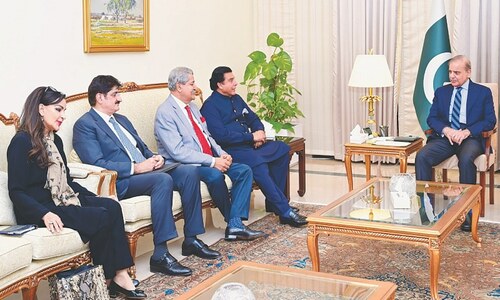RIYADH, Feb 19: Prime Minister Shaukat Aziz said on Saturday that Pakistan's economy was expected to achieve a growth rate of eight per cent over the next several years.
"We believe that we have laid the foundation of a stable and strong economy and the stage is now set for the economy to grow more vigorously (at) 8 per cent per annum over the next several years," Mr Aziz told participants at the opening session of the Sixth Jeddah Economic Forum.
He said that policies of the past five years had transformed the country into 'an exciting and resurgent economy'. He pointed out that at the end of the 1990s, Pakistan was facing three major challenges: rising debt, declining investment and decelerating growth.
He said the country required macroeconomic stability, financial discipline and consistent and transparent policies along with a courageous leadership willing to undertake difficult decisions.
A two-pronged strategy was adopted, said the prime minister, adding that on the one hand measures were taken to improve the country's macro-economic environment and on the other wide-raging structural reforms were introduced.
Reading from his paper 'transforming a nation: early challenges, 'obstacles and successes,' Mr Aziz said Pakistan's economy was no longer fragile. "Private sector is buoyant having borrowed $10 billion over the last 18 months.
Import of machinery, equipment and raw material has gone up by 40 per cent and industrial sector is growing in the range of 16-18 per cent per annum," said the prime minister, adding that Pakistan would emerge as one of the five fastest growing economies of Asia.
He said that in order to keep pace with development the country was embarking on the 'second generation reform' and added that the focus of his government was on "human development strategy aimed at effective utilization of available resources through improved institutional mechanism."
He told the forum that the micro-finance scheme had changed many lives in the country. Small and Medium Enterprises (SMEs) was at the centre stage of the policymaking as it provided employment to bulk of non-agriculture workforce.
Emphasising the role of the private sector, Mr Aziz said the country was open to 100 per cent foreign ownership. Eighty-five per cent of banks were in foreign hands and the privatization programme was moving ahead, he said, adding that recently the Karachi Electric Supply Corporation had been sold to a foreign group.
Pakistan, he said, was emerging as a trade and manufacturing hub connecting North Asia, Central Asia, West Asia, South Asia and the Middle East. He urged the participants to look at the potential and possibilities offered by the country.
A question-answer session followed the premier's speech. Academics, intellectuals, business people and economists asked questions on various issues confronting Pakistan and the region.
The three-day congress started amid unprecedented security. The presidents of Nigeria, Afghanistan and Senegal and the prime minister of Malaysia were scheduled to address the congress.
Former US secretary of state Madeline Albright, Arab League secretary-general Amro Moussa and Suzan Mubarak, the Egyptian first lady, will also read papers at the congress.
Prince Faisal bin Turki, the former Saudi intelligence chief and the current ambassador to Britain, and Saudi Labour Minister Ghazi Al-Gosaibi will also address the congress.
Meanwhile, Prime Minister Aziz met the Islamic Development Bank president. Issues of mutual interests and the IDB's role in the development of member economies were discussed.
Later, Saudi Finance Minister Ibrahim Al-Assaf called on the prime minister and discussed with him ways of promoting ties between the two countries. Mr Aziz later arrived in Riyadh on the last leg of his three-day visit to Saudi Arabia.
On Sunday, he will meet King Fahd bin Abdul Aziz al Saud and Crown Prince Abdullah bin Abdul Aziz, the Deputy Prime Minister and Commander of the National Guards.














































Dear visitor, the comments section is undergoing an overhaul and will return soon.